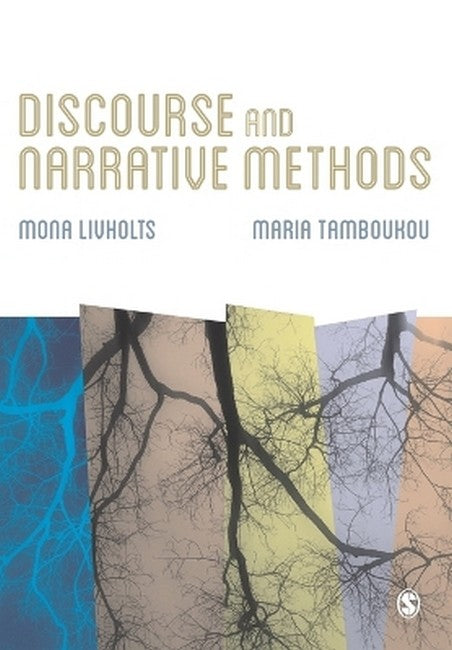Mona Livholts (BA, MA, PhD) is Associate Professor of Social Work at the Department of Social and Welfare Studies at Linkoeping University, Sweden, and coordinator of R.A.W., The Network for Reflexive Academic Writing Methodologies. The main focus of her work is emergent writing methodologies, discourse and narrative methods and artistic research processes. Research themes include media and social work, gender and intersectionality, space, memory and technological transformation. She has published monographs, co-edited and edited volumes in Swedish and English, including, 'Women', Welfare, Textual Politics and Critique. An Invitation to a ThinkingWriting Methodology in the Study of Welfare, Emergent Writing Methodologies in Feminist Studies, and a trilogy of untimely academic novellas: 'The Professor's Chair', 'The Snow Angel and Other Imprints', and 'Writing Water'. Maria Tamboukou (BA, MA, PhD) is a professor of feminist studies at the University of East London, UK. Her research activity develops in the areas of philosophies and epistemologies in the social sciences, feminist theories, narrative analytics, and archival research. Writing feminist genealogies is the central focus of her work. She is the author of seven monographs and more than 70 journal articles and book chapters. Recent publications include the monographs Sewing, Writing and Fighting; Gendering the Memory of Work; Women Workers' Education as well as the coauthored the book The Archive Project.
Request Academic Copy
Please copy the ISBN for submitting review copy form
Description
PART I: Introducing Discourse and Narrative Methods Chapter 1. The Becoming of a Textbook. A Readers Guide Chapter 2. Theoretical and Methodological Departures in Contested Fields of Study Chapter 3. Themes: Media and Society, Gender and Space, Autobiography and Life Writing PART II: Narrative and Discourse: Making Connections Chapter 4. Narrative Phenomena: Entanglements and Intra-Actions in Narrative Research Chapter 5. Discourse, Authoring and Performativity Chapter 6. Narrative Modalities of Power Chapter 7. Discourse, Power and Representation Chapter 8. Narrative as force Chapter 9. Discourses as Embodied Genealogies Chapter 10. Narrative and the Political PART III: Situated and Reflective Writing Sessions Chapter 11. A Politics of Location in Discourse and Narrative Methods Chapter 12. Working with Diaries and Letters Chapter 13. Working with Memories Chapter 14. Untimely Academic Novella Writing
Discourse and Narrative Methods interrogates the debates on narrative and discourse from a fresh and powerful perspective. By revitalizing the post-structuralist feminist theory, Livholts and Tamboukou generate veritable canons of their own, foregrounding such authors as Hannah Arendt, Adriana Cavarero and Judith Butler. The idea of narrative as force, in particular, is intriguing and deserves further discussion. Diary, letters, autobiography and memory work are only few examples of the areas where the methods are tested. This is indeed an inspiring exercise in theory, analysis and personal writing. -- Matti Hyvaerinen We have long needed a good book about how to do discourse analysis and narrative research - and this is it. Livholts and Tamboukou have written a book that is comprehensive, accessible and most importantly practical. It is an invaluable resource for students and teachers of research methods - covering the whole research process from theoretical underpinnings through data collection and analysis. -- Stephen Ball This book draws together the domains of discourse and narrative theorizing and research methodologies, in a comprehensive and comprehensible way, without offering easy answers to the perennial reductionist question: "What is the difference between narrative and discourse?" Instead, the dialogical structure of the text mirrors the connections and diffractions between the two approaches, offering us the distinct voices of two writers whose work is sometimes in synergy and interwoven, and at other times, departs along parallel lines to explore different terrains. The text is a wonderful contribution in the best tradition of feminist scholarship; a blend of personal stories, political commitments to social justice, and rigorous theorizing. -- Jill Bradbury Lively and engaging, this book opens up powerful new approaches for understanding and enacting discourse and narrative methods. Drawing on their own research experiences, and working with examples of data from across themes of gender and space, media and society, and autobiographical writing, the authors effortlessly blend analysis of theoretical and social contexts with valuable, practical research strategies. Exploring differences and connections across narrative and research methods, Livholts and Tamboukou offer dazzling insights as well as welcome guidance for the beginner and experienced researcher alike. With its compelling storylines and clear-sighted accounts, this book simply stands apart from stock-standard methods textbooks and will fast become a classic reference for anyone grappling with the richness of these methods. -- Julie McLeod A book full of insights, theoretical trails for students to follow, and voluminous references to the diversity of scholarly work informing narrative and discourse. Livholts and Tamboukou provide an important corrective to overly pragmatic books that emphasizes the "doing" of a narrative study. They invite us to think deeply about talk and text, visual image and power, and to interrogate our situated positions as researchers - essential components of good scholarly work. -- Catherine Riessman

